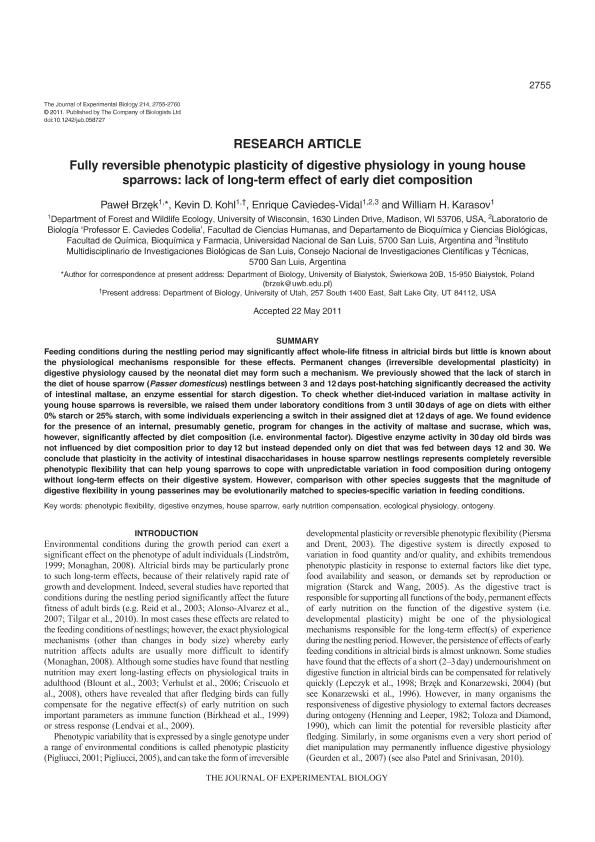Mostrar el registro sencillo del ítem
dc.contributor.author
Brzęk, Pawel
dc.contributor.author
Kohl, Kevin D.
dc.contributor.author
Caviedes Vidal, Enrique Juan Raul

dc.contributor.author
Karasov, William H.
dc.date.available
2017-04-03T18:22:40Z
dc.date.issued
2011-08
dc.identifier.citation
Brzęk, Pawel; Kohl, Kevin D.; Caviedes Vidal, Enrique Juan Raul; Karasov, William H.; Fully reversible phenotypic plasticity of digestive physiology in young house sparrows: lack of long-term effect of early diet composition; Company of Biologists; Journal of Experimental Biology; 214; 16; 8-2011; 2755-2760
dc.identifier.issn
0022-0949
dc.identifier.uri
http://hdl.handle.net/11336/14707
dc.description.abstract
Feeding conditions during the nestling period may significantly affect whole-life fitness in altricial birds but little is known about the physiological mechanisms responsible for these effects. Permanent changes (irreversible developmental plasticity) in digestive physiology caused by the neonatal diet may form such a mechanism. We previously showed that the lack of starch in the diet of house sparrow (Passer domesticus) nestlings between 3 and 12 days post-hatching significantly decreased the activity of intestinal maltase, an enzyme essential for starch digestion. To check whether diet-induced variation in maltase activity in young house sparrows is reversible, we raised them under laboratory conditions from 3 until 30 days of age on diets with either 0% starch or 25% starch, with some individuals experiencing a switch in their assigned diet at 12 days of age. We found evidence for the presence of an internal, presumably genetic, program for changes in the activity of maltase and sucrase, which was, however, significantly affected by diet composition (i.e. environmental factor). Digestive enzyme activity in 30 day old birds was not influenced by diet composition prior to day 12 but instead depended only on diet that was fed between days 12 and 30. We conclude that plasticity in the activity of intestinal disaccharidases in house sparrow nestlings represents completely reversible phenotypic flexibility that can help young sparrows to cope with unpredictable variation in food composition during ontogeny without long-term effects on their digestive system. However, comparison with other species suggests that the magnitude of digestive flexibility in young passerines may be evolutionarily matched to species-specific variation in feeding conditions.
dc.format
application/pdf
dc.language.iso
eng
dc.publisher
Company of Biologists

dc.rights
info:eu-repo/semantics/openAccess
dc.rights.uri
https://creativecommons.org/licenses/by/2.5/ar/
dc.subject
Phenotypic Flexibility
dc.subject
Digestive Enzymes
dc.subject
House Sparrow
dc.subject
Early Nutrition Compensation
dc.subject
Ecological Physiology
dc.subject
Ontogeny
dc.subject.classification
Zoología, Ornitología, Entomología, Etología

dc.subject.classification
Ciencias Biológicas

dc.subject.classification
CIENCIAS NATURALES Y EXACTAS

dc.title
Fully reversible phenotypic plasticity of digestive physiology in young house sparrows: lack of long-term effect of early diet composition
dc.type
info:eu-repo/semantics/article
dc.type
info:ar-repo/semantics/artículo
dc.type
info:eu-repo/semantics/publishedVersion
dc.date.updated
2017-03-30T17:42:29Z
dc.journal.volume
214
dc.journal.number
16
dc.journal.pagination
2755-2760
dc.journal.pais
Reino Unido

dc.journal.ciudad
Cambridge
dc.description.fil
Fil: Brzęk, Pawel. University of Wisconsin; Estados Unidos. University of Bialystok; Polonia
dc.description.fil
Fil: Kohl, Kevin D.. University of Wisconsin; Estados Unidos. University of Utah; Estados Unidos
dc.description.fil
Fil: Caviedes Vidal, Enrique Juan Raul. Universidad Nacional de San Luis. Facultad de Quimica, Bioquimica y Farmacia. Departamento de Bioquímica y Ciencias Biológicas; Argentina. Consejo Nacional de Investigaciones Científicas y Técnicas. Centro Científico Tecnológico San Luis. Instituto Multidisciplinario de Investigaciones Biológicas de San Luis; Argentina
dc.description.fil
Fil: Karasov, William H.. University of Wisconsin; Estados Unidos
dc.journal.title
Journal of Experimental Biology

dc.relation.alternativeid
info:eu-repo/semantics/altIdentifier/url/http://jeb.biologists.org/content/214/16/2755
dc.relation.alternativeid
info:eu-repo/semantics/altIdentifier/doi/http://dx.doi.org/10.1242/jeb.058727
Archivos asociados
